Now Playing
Current DJ: CHIRP DJ
Plankton Wat Defund the Police from Future Times (Thrill Jockey) Add to Collection
Requests? 773-DJ-SONGS or .(JavaScript must be enabled to view this email address)
Welcome to The Fourth Wall, CHIRP's e-conversation on cinema. This week's subject is the 2022 film Barbarian.
This edition is written by CHIRP Radio volunteers Kevin Fullam and Cassondra Branderhorst.
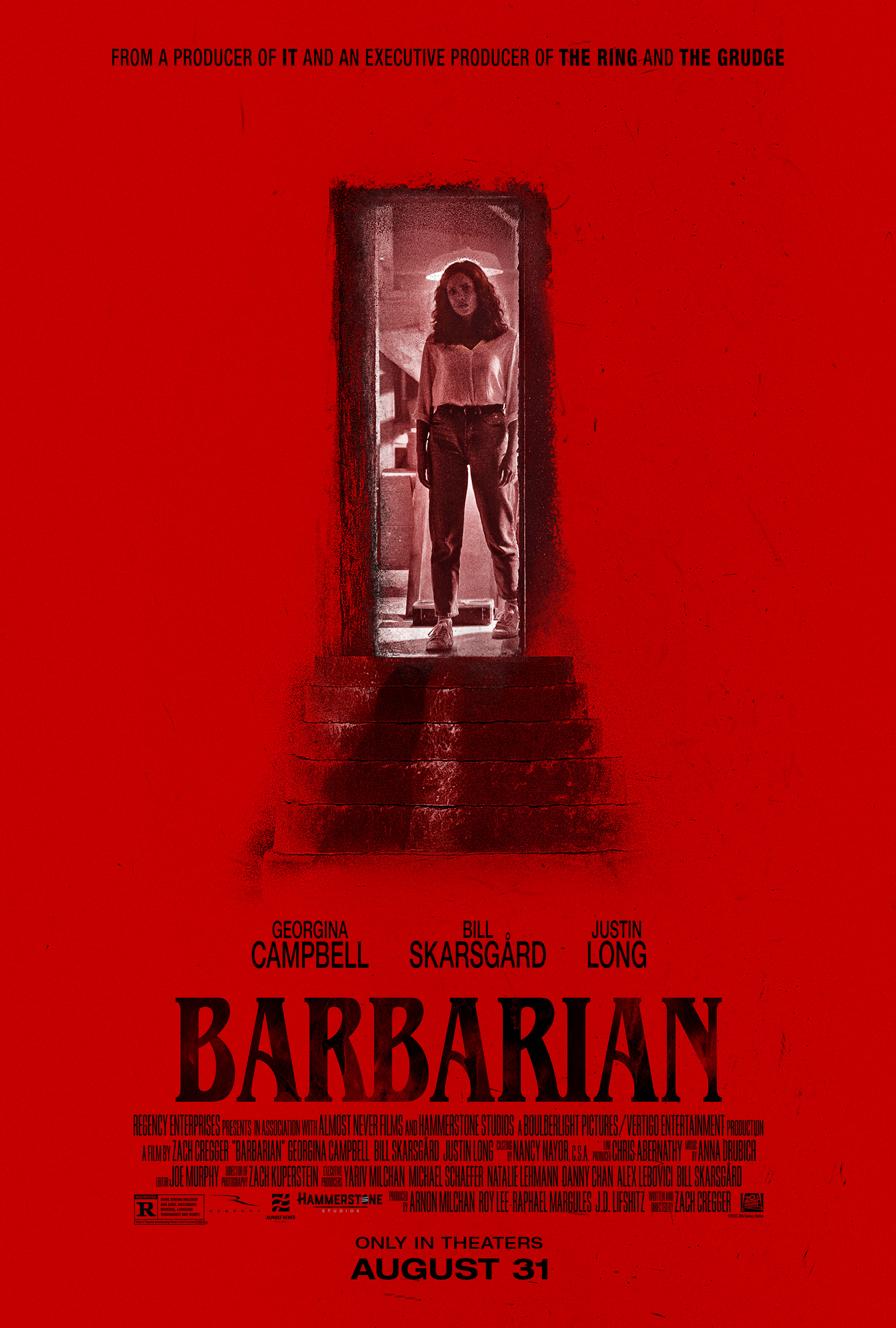
Kevin:
Too Dumb To Live: "There's simple ignorance, when you just didn't know something. There's catching the Idiot Ball, which is a momentary lapse. There's fear and panic in a chaotic situation. All those situations are understandable reasons for making poor decisions... Then there's these guys. People who are so stupid that they simply do not deserve to survive." -- The bible of storytelling devices, TV Tropes.
When we invest our time in a horror film, we implicitly enter an unspoken agreement to cut the screenwriters some slack. Situations which would send any sane human heading for the hills have to be massaged in such a manner that keeps the narrative rolling. If Poltergeist played out the way Eddie Murphy describes here, it would have been a very short movie indeed.
The question is... how much suspension of disbelief should we allow? Even within a genre where we need to willingly go along with all sorts of supernatural plot twists, doesn't there come a point where enough is enough? This brings me to one of the biggest indie horror hits of the past year, Barbarian.
Twentysomething Tess (Georgina Campbell) arrives late at night at an Airbnb in a terrible Detroit neighborhood; she has a job interview the next day. We've all read the stories about Detroit, yes? This ain't just a rundown section of the city -- the house is the only intact building on the block. She can't access the key to the house because, surprise, it's been already rented out to another guest, Keith, via a different lodging service.
Tess manages to rouse Keith (played in amicable yet creepy fashion by Bill Skarsgård) and reluctantly accepts his invitation to enter the house. And so begins a long stream of character decisions which run the gamut from "questionable" to "batshit crazy."
1) Tess would wisely rather get a hotel room than share a house with a strange man. She contacts one hotel, finds out it's booked (due to a big conference, Keith explains), and promptly gives up. Er... what? She wouldn't go down the list of hotels? Fire up Expedia? Look for suburban options? Anything? But OK, as I said, we've gotta just roll with it.
2) Keith wins her over and Tess stays -- despite the fact that her bedroom door mysteriously opens during the night. Seeing as how Tess can clearly see the next morning that her home resides in something resembling a bombed-out war zone, you would think she'd pack all her stuff so that she could leave town straight after her interview, right? Nope. Again, questionable, but whatever.
3) Tess is back at the house and on edge, barely making it inside after getting chased by a homeless denizen. Keith is gone, and after Tess gets locked in the basement (via another mysterious door), she discovers a hidden passage that culminates in a dingy room with a bed, a camera tripod... and a bloody handprint on the wall. Now that triggers some serious internal alarms, and when Tess is rescued from the basement by a returning Keith, she's ready to bolt.
4) But now it's Keith who refuses to listen. Cassie, if I came to you and said, "The building we're in has a dungeon of horrors down below and we've gotta get outta here, pronto!," would you still need to investigate for yourself? And if you did venture down there and didn't return, would I come after you? (Sorry, ladies, you can lament all you want about chivalry being dead, but sayonara.)
It makes even less sense that Tess would go in after Keith. She has no weapons. It's a reasonable assumption that whatever swallowed up Keith (and we do discover what that is) would do the same to her. Even if you wanted to help Keith, wouldn't you lock yourself in your car, call the cops, and wait for them to arrive?
Despite these critiques, Barbarian does deliver an uber-creepy first act -- leading to a bit of a hilarious mood jolt when the focus abruptly shifts to up-and-coming (or so it seems) actor AJ (Justin Long), cruising along the California coast in a convertible. Due to a combo of circumstances and unseemly behavior, he'll soon find his way to Detroit as well. As it turns out, AJ owns the mysterious house in question, and his return will not bode well for him.
One can't really deliver more plot details without venturing into serious Spoiler Territory. Just know that AJ does cross paths with Tess, and the forces that lurk in the labyrinthine basement corridors are quite sinister indeed.
-- The film could definitely be Exhibit A as far as gender/power imbalance. Tess flat-out admits that she'd never allow Keith to stay with her if the roles were flipped and he had showed up on her doorstep at night. Keith is calm and collected (if a tad offputting) while trying to convince her to stay, perhaps with amorous intentions lurking? And then there's AJ, who not only might've date-raped a co-star, but also exhibits a foolhardy level of bravado that I doubt you'd see in the most drunken of Vikings. At one point, he explicitly threatens any unseen evildoers by saying, "I'm a man!" If AJ was secretly pining for Valhalla, he was not disappointed. What did you make of this? On point, or perhaps over the top?
-- Let's return to the topic of suspension of disbelief. Maybe Barbarian didn't cross your particular threshold? And if not, have there been other horror films in the past which have? Beyond what I've already described, there's a Final Act moment where a character gets thrown off a water tower that must've been... what, 50 or 60 feet high? More? And lands on asphalt. And survives. ?!?!?!? Words fail me here.
Cassie:
Horror movie legend (and one of my own personal heroes) Sam Raimi asserted that horror movies must abide by three major rules: the innocent must suffer, the guilty must be punished, and the hero must taste blood to be a (wo)man. All of this is done in Barbarian, and while a HUGE amount of suspension of belief is required to get through the film, at the heart of this story is the question: "who are the real monsters?"
Had any of the characters made better decisions, this would have been a short movie. But disaster could've also been averted had any of the characters actually listened to our female protagonist, Tess. Keith doesn't listen when she begs him to stay out of the basement, the police very obviously do not listen to her when she begs them to investigate, and AJ definitely doesn't listen to her pleas (and reaps his chilling reward in the basement). All the while, Tess continues to sacrifice herself in order to serve... men. Is it a coincidence that the protagonist and the major antagonist are both female? No. Also, another marginalized character's warnings are not heeded: the unhoused man Andre (Jaymes Butler). Which brings up the next point...
The setting for this film adds a symbolic twist. Detroit, the poster child for disadvantage and disrepair, takes center stage as does the subject of gentrification. Full disclosure, I was in Detroit this last weekend and it continues to be one of my favorite cities (besides Chicago, of course). While it retains a negative stigma, it is on the rise and, much like our beautiful city of Chicago, its bad reputation is mostly unfounded. However, this affords the perfect opportunity to also consider the horrors of poverty, deindustrialization, and the disintegration of once great metro-areas.
A couple more things to address before getting to your questions without too much spoilery: I loved the casting of AJ and Keith. Also, AJ definitely sexually assaulted that woman. We don't see it in the movie, but the implications were not subtle. In the age of "Me Too," we trust women, and he admits to it (while creepily and uncomfortably self-justifying it to his dude-bro friend in the bar), and then calls her to apologize against the advice of his attorneys. YIKES. On to the questions!
-- AJ was made out to be the quintessential, Hollywood a$$hole. He serves as a comedic foil, but he's also someone whom you want to see get his comeuppance. And boy does his uppance come! He was over the top, but this makes his demise much more satisfying.
-- All of the great horror movie baddies are virtually indestructible: Jason, Michael Myers, Freddie Krueger. They just won't die or, at the very least, won't stay dead. This is what makes them so iconic! And who doesn't love to see the once-thought-to-be-dead killer pop up in the background promising a sequel?
-- As mentioned above, there is some really interesting subtext in this film. While screaming at the TV is a very reasonable reaction (guilty!), the battle between our humanity and more depraved instincts lies just below the surface. Barbarian is an allegory for women and self-immolation in the interest of the preservation of men. It casts a light on our nasty human habit of not believing or listening to people because of their station in life. And, it forces us to see the evil in ourselves.
Despite all of the heavy subject matter, this movie also passes a personal bar for horror films: it was FUN! The dichotomy of comedy and horror keeps you on your toes. Not an easy balance to strike.
Kevin:
Well, I have to push back a little bit here. Remember that Tess also ignored the advice given to her (by another woman, no less) at the conclusion of her interview, when her prospective employer learned where Tess was staying. And I'm pretty sure that if any of us were accosted by ranting & raving homeless individuals, we would beat hasty retreats. It's not a case of ignoring a marginalized character -- it's simply good sense.
[On that note, the wisdom offered by said gentleman (Andre) turned out to be not so prudent after all! They were all "safe in the water tower," eh...?]
Cassie:
Appreciate the pushback-isn't it more fun if we disagree a bit? Tess did ignore the advice of her would-be employer, but we cannot be sure that she wasn't planning to leave. It appeared to me that she went back to meet back up with Keith? And also, weren't her things still there? Most people would be startled by someone running at them and yelling, but would it have been different if it was someone else better dressed, a woman, in a "better" neighborhood, etc.? The fear was likely a result of stereotypes that persist for people who are experiencing homelessness as a group (that they are all dangerous, mentally ill, have substance use disorder, etc.). The point is, sometimes women don't listen to women. But, men don't listen to women (or have the same radar for potential danger as women) far more often.
As far as Andre, that part was a head scratcher. Why did the mother leave him alone all that time and only decide to hurt him when he was with her "baby"? Did she believe that she was protecting Tess from the men (like she wished someone had done for her)?
Kevin:
The perception of Detroit for the past few decades is that the city is basically a giant DMZ: Enter At Your Own Risk. Crime data can certainly be misleading; Chicago is tagged as a high-crime metro, but all the city's most dangerous neighborhoods are concentrated on the South/West Sides. That being said, this report has Detroit as the second-most violent city in America, with a per-capita violence rate double that of Chicago. (And to be honest, given the lack of law enforcement and by extension police reports, that figure could be even higher.) However, you've been there recently -- how do you feel that Barbarian is painting an unfair picture of the town?
Cassie:
I spoke to a friend who is a long-time Detroit resident and pretty knowledgeable on the subject. He reported that though Broadmoor isn't super safe (he would advise against renting an AirBnB there), he used to play softball in a park there and has other friends that are there trying to turn the neighborhood around. Downtown Detroit is a very sleek metropolitan area; there are Gucci and Shinola stores, pop-ups in previously unused alleys, and many expensive pieces of real estate. It's cool. Are some areas more dangerous than others in the city as a whole? Sure. But, gentrification (which can be a double-edged sword) continues and the new development has been thoughtfully planned (thanks largely to Dan Gilbert). As NPR put it in a recent article, 10 years post-bankruptcy, the city is getting there. Of course, there are still some challenges it will need to overcome. When will the stigma abate? Time will tell.
Kevin:
Since we're talking about Detroit and film... any thoughts about the RoboCop statue? The original movie is a landmark work full of brilliant satire, but why would the city want to celebrate this? A saga about a lawless Future Detroit that's been beaten into submission by corporate overlords? It's a bit puzzling.
Cassie:
Oh, the RoboCop statue. It was a crowdfunded venture. Much like one of the funniest stories about what can happen during crowdsourcing, it does seem silly. But, let's just let Detroit have this one, okay? Okay! 😊
Kevin:
Completely agreed that Jason, Michael Myers and the like are written as nigh-invulnerable antagonists. (The level of firepower arrayed against a single guy with a rusty machete here is almost comical.) But Tess ain't Rasputin, and she was the one I was referring to, regarding the fall from the very, very tall water tower. Are we supposed to believe that the creature somehow beat Tess to the ground despite diving a second after her? Even if this was the case, which seems impossible, it shouldn't make much difference. There's suspension of disbelief, horror yarn suspension of disbelief, and "come on!"
Cassie:
In short, yes. We are supposed to assume that the mother broke Tess' fall. But, what a great way for it all to end! The mother saves Tess only for Tess to be ultimately responsible for the former's demise (especially if what I pointed out above is true and the mother was only trying to protect Tess). Sometimes, women are the largest supporters and defenders of a patriarchal society that will ultimately harm them.
Kevin:
You mentioned that you saw the film as an "allegory for women and self-immolation in the interest of the preservation of men." Is this a bad thing, given the countless number of tales since time immemorial where men have risked life and limb to rescue women? It's actually pretty refreshing to see ladies return the favor in recent generations! Tess isn't quite Ripley from Aliens (a landmark action heroine) -- for one thing, Ripley would've never entered that tunnel unarmed.
Cassie:
Tess is a survivor; that much is clear. And yes, previously, movies made by mostly male filmmakers have featured the trope of the heroic male figure saving the damsel in distress. It was good to see Barbarian's damsel doing for herself, agreed. But the allegory I was pointing out is not literal. It's meant to make us examine the societal mirror it holds up.
Kevin:
Though if we're staying with that Aliens analogy, then AJ is definitely Carter Burke, a seemingly-affable fellow who quickly sells out any and all around him to save his own hide when the chips are down.
Cassie
This brings me back to the title of the film, Barbarian. The definition of barbarian according to Dictionary.com is: (n) a person in a savage, primitive state; uncivilized person OR a person without culture, refinement, or education; philistine. Who was the barbarian? The mother? By all accounts, she fits the definition. But what made her that way? A good argument could be made for the father or AJ being the real barbarians. Possibly both. Or maybe even the unhoused man in the film. Perhaps I'm reaching and it is meant to be taken at face value? (The street the house is on is called "Barbary," after all.) But I think we can safely expect social commentary from a director who was advised by The Jordan Peele on his film.
Welcome to The Fourth Wall, CHIRP's e-conversation on cinema. This week's subject is the 2010 film Blue Valentine.
This edition is written by CHIRP Radio volunteers Kevin Fullam and Cassondra Branderhorst.
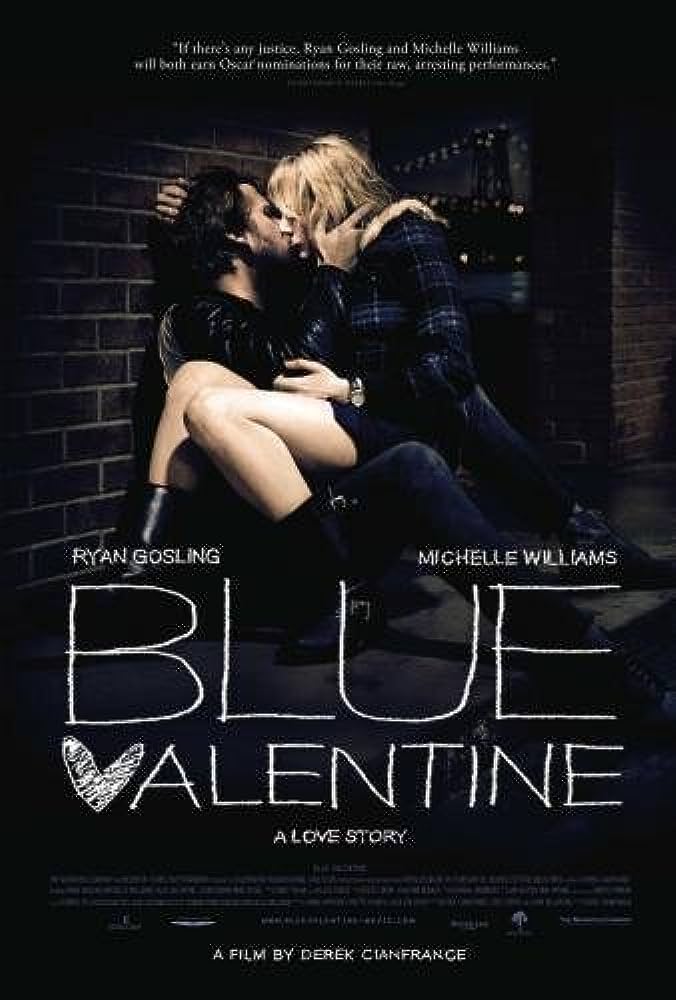
Kevin:
Early on in Blue Valentine, the image that came to mind was that of an oscilloscope. What happens when you have a pair of harmonic waves that are just slightly misaligned? Over time, small differences can magnify into huge disconnects, where the two may find themselves moving in opposite directions.
In the Hollywood of yesteryear, the story of Cindy (Michelle Williams in an Oscar-nominated performance) and Dean (Ryan Gosling) would have all the trappings of a romantic comedy. There's the meet-cute (while visiting residents of a senior home), the disparate backgrounds (she's a college student, he's a high-school dropout who works for a moving company), the winsome impromptu first date (where his ukulele serenade wins her over), and even a jealous ex (played in rather creepy fashion by Mike Vogel) to boot.
In Blue Valentine, however, these elements are relayed via a series of flashbacks and comprise only half of the tale. The present day has us checking up on their marriage, five years in... and clearly, the honeymoon has long worn off. Cindy can't fathom why Dean seems content with menial work; he can't understand why the charming disposition she fell in love with no longer seems good enough for her today.
Matters reach a breaking point when Dean -- over Cindy's objections -- plans an evening for the two of them at a hotel with "theme" suites, which in their case is ominously titled "The Future." (Picture the bridge of the Starship Enterprise.) Relations are frosty before they've even arrived. Cindy is exhausted and also on call for her job as a nurse, and there's additional tension in the air after she mentions that she bumped into the aforementioned ex at a liquor store on the way there. The ex's opening salvo: Have you been faithful to your husband? Ouch.
Welcome to The Fourth Wall, CHIRP's e-conversation on cinema. This week's subject is the use of music in movies.
This edition is written by CHIRP Radio volunteers Kevin Fullam and Clarence Ewing.
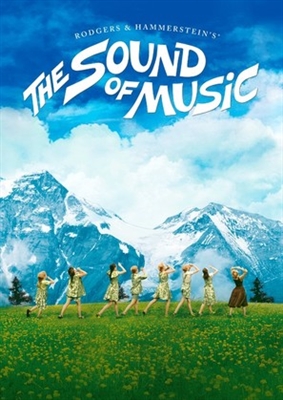
Kevin:
The one-two trumpet punches of Rocky. The orchestral explosion when the Star Wars logo hits the screen. The menacing, oh-so-cool guitar riff hallmarking the entrance of 007.
Can't imagine these films or characters without their tagline anthems, can you? Strip away the Indiana Jones theme from the titular character? Might as well take the poor guy's fedora and bullwhip as well.
Of course, the power of music in film goes well beyond rousing heroic scores. There are the sweeping strings that seemed to punctuate many Hollywood romances of yesteryear, and more recently, much ink has been spilled over the role of music in horror tales, as discordance can ramp up tension even more than the sight of a rusty machete.
To say nothing of diegetic sound* -- maybe it's not such a great idea to play a crackly Joanna Newsom record ("Sprout and the Bean" in The Strangers) when you're alone and worried about a home invasion?
[* This refers to music that's audible to the characters in the film, like when someone flips on a car radio while cruising around, or, in the case of Rachel Getting Married, when TV On The Radio's Tunde Adebimpe sings at his own wedding on screen.]
The 2016 documentary SCORE! is a great primer on the subject, but as this is a CHIRP production, perhaps we should also explore a tangential avenue and talk about the intersection of cinema and independent music?
Welcome to The Fourth Wall, CHIRP's e-conversation on cinema. This week's subject is the 2022 film Everything Everywhere All at Once.
This edition is written by CHIRP Radio volunteers Kevin Fullam and Clarence Ewing.
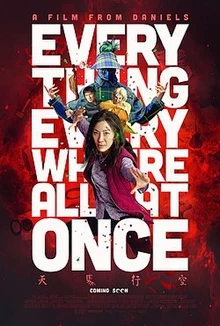
Clarence:
By most measures, Evelyn Quan Wang (Michelle Yeoh) is an average person just trying to get by. Her laundromat business is a headache, her marriage to her beta-male husband Waymond (Ke Huy Quan) has lost its magic, and her relationship with her daughter Joy (Stephanie Hsu) is strained to the breaking point.
But she can’t imagine how big her problems are going to get. One day while sitting in an IRS office trying to unravel a tax issue, her husband pops up out of nowhere and asks for her help to save the universe.
Actually, not her exact husband, but a different version of him from an alternate reality, and not just this universe, but the multiple universes that make up the totality of existence.
It turns out that Jobu Tupaki, an alternate version of Evelyn’s daughter, has gained enormous power and is in a really bad (as in, reality-erasing) mood, and this version of Evelyn is the only one who might be able to stop her from ending things for everyone.
Welcome to The Fourth Wall, CHIRP's e-conversation on cinema. This week's subject is the 1997 film The Spanish Prisoner.
This edition is written by CHIRP Radio volunteers Kevin Fullam and Clarence Ewing.
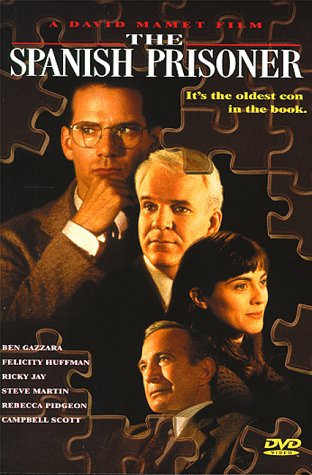
Kevin:
The Big Con. It's long been a favorite cinema staple of mine. You can't sleepwalk through Big Con films -- you gotta keep your eyes and ears peeled at all times, and definitely, absolutely trust no one. As an added bonus, the Everyman protagonists of these tales are usually in the dark as much as the audiences, making them the perfect proxy. We're attached at the hip and invested from the get-go.
In David Mamet's The Spanish Prisoner, Joe Ross (Campbell Scott, whose muted temperament is the perfect fit for this sort of role) has created a "Process." Manifested as a notebook of charts and formulas, it's a classic MacGuffin -- we have no idea what it exactly involves, except that it's worth astronomical sums of money to the company which employs him... or to anyone else who winds up getting a hold of it.
While on the island of St. Estèphe to discuss the Process with company investors, Ross rubs elbows with new secretary Susan Ricci (Rebecca Pidgeon, Mamet's real-life wife) and wealthy traveler Jimmy Dell (Steve Martin), the latter of whom eases himself into Joe's world by giving him a package to "deliver to his sister in New York." Worried it might be something illegal, Joe opens the package -- which is revealed to be an innocuous 1930s book about tennis.
Right around this time, relations between Joe and his employers turn frosty, and he starts to fret about not receiving fair compensation. Jimmy (having reconnected in the Big Apple) suggests enlisting outside legal counsel. Can he trust him? What about Susan? And later there's an FBI team (headed by Ed O' Neill) involved in the case as well. But are they actually federal agents? Just when exactly does the con stop... or is it still going when the credits start rolling?